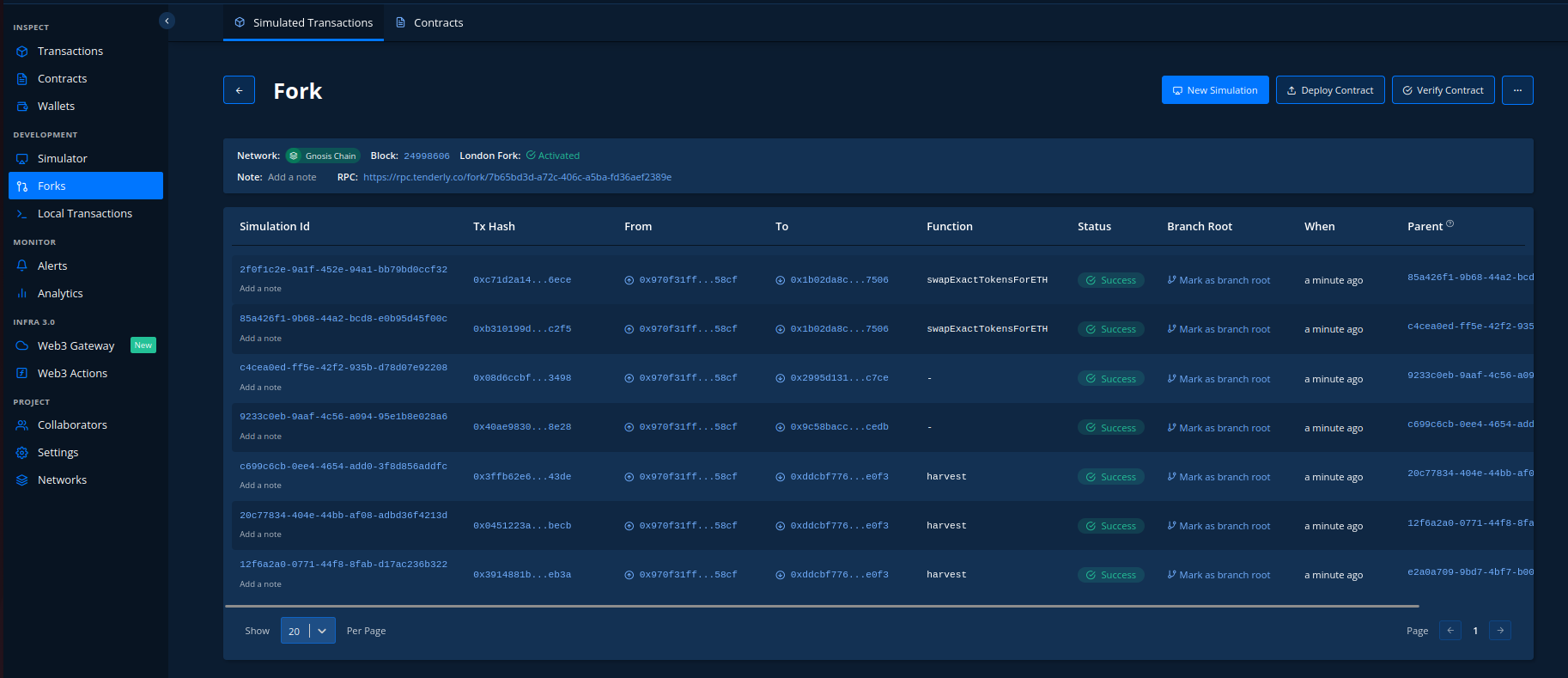Simulating Scripts
With the power of Tenderly you can simulate your EVM scripts right inside the terminal. You'll need a Tenderly subscription and an Access Token to get started. You can find how to get an Access Token in the Tenderly documentation.
note
Tenderly subscriptions (and subsequently simulating transactions) are not a free service. However, Tenderly does offer free 14-day trials (at the time of writing).
To create a transaction simulation, you use the following syntax:
# Define the chain you want to simulate the transaction on
switch <chainIdNumber>
# Load the module as "sim" - this can be any alias you choose
load tenderly as sim
# Set your Tenderly access token
set $tenderly <tenderlyUserName>/<myProjectName>/<accessToken>
sim:fork (
# Here, you insert the body of your script
)
This script will generate a pop-up containing the link to your forked simulation on Tenderly; click on it to see the magic happening!

Simulating from another address
If you would like to simulate a transaction using a different address than the connected one as the sender, We can do this with the --from option. We can add this next to sim:fork or append it onto the exec commands executing an action. As an example, the syntax could look like this:
switch 1
load tenderly as sim
load aragonos as ar
set $tenderly mitch/best-project/123456LOL1337rofl911irl
sim:fork (
set $someAddress 0x3acf13df5af4de0fe2c69e1690e475186eee053e
exec $sushiFarm harvest(uint256,address) 0 @me --from $someAddress
exec $sushiFarm harvest(uint256,address) 1 @me --from $someAddress
exec $sushiFarm harvest(uint256,address) 5 @me --from $someAddress
)
Or:
switch 1
load tenderly as sim
load aragonos as ar
set $tenderly mitch/best-project/123456LOL1337rofl911irl
set $someAddress 0x3acf13df5af4de0fe2c69e1690e475186eee053e
sim:fork --from $anotherAddress (
exec $sushiFarm harvest(uint256,address) 0 @me
exec $sushiFarm harvest(uint256,address) 1 @me
exec $sushiFarm harvest(uint256,address) 5 @me
)
Creating tests with expect
You can use the expect command in your simulation code to specify an expected outcome or test case. This command works through basic logic operators such as >, <, ==, !=. The basic syntax for expect looks like this:
expect <ValueOrAction> <logicalOperator> <expectedValue>
This format loosely follows the logic of the chai assertion library.
Here's some examples of how to implement expect in your simulations:
load tenderly as sim
set $tenderly mitch/best-project/123456LOL1337rofl911irl
set $myContract 0xdac17f958d2ee523a2206206994597c13d831ec7
sim:fork (
exec @token(DAI) transfer(address,uint256) $myContract 100e18
expect @token(DAI)::balanceOf($myContract) >= 100e18
)
Or perhaps something a bit more complex:
# Allow passing a proposal after enough time in a Garden DAO
load tenderly as sim
set $tenderly mitch/best-project/123456LOL1337rofl911irl
set $gardenVoters [0x6120f29ccb5b1DDaa5a747235F257Ef6cB47970F, 0xc89000E12C600b12D6e61a535cD3fedd4ac1eeC4, 0xa328500Eab25698b8b146D195F35f5b26C93AAEe]
sim:fork (
set $proposalId $conviction::proposalCounter()
exec $conviction addProposal(string,bytes,uint256,bool,address) "Test proposal" "0x" 50e18 false $somebodyElse --from $gardenHolder
for $gardenVoter of $gardenVoters (
exec $conviction stakeToProposal(uint,uint) $proposalId 400e18 --from $gardenVoter
)
wait 30d 5s
exec $conviction executeProposal(uint) $proposalId
expect $conviction::requestToken()::balanceOf($somebodyElse) >= 50e18
)
tip
expect can also be used outside a sim:fork block with sim:expect. When you run EXECUTE, EVMcrispr will print a notification telling you whether your expect command returned true or false.
For example:
set $numberOne 2
set $numberTwo 3
load tenderly as sim
sim:expect ($numberOne + $numberTwo) == 5
Simulating from a specific block number
You can simulate a transaction specifying a certain past block number to make the simulation from. We can implement the syntax as such:
switch <chainId>
sim:fork --block-number <blockNumber> (
# Insert the body of your script here
)
For example:
# Switch to Gnosis Chain
switch 100
load tenderly as sim
set $token.tokenlist https://tokens.honeyswap.org
set $tenderly mitch/best-project/123456LOL1337rofl911irl
set $GIVstakingContract 0xD93d3bDBa18ebcB3317a57119ea44ed2Cf41C2F2
set $GIVtokenManager 0x24F2d06446AF8D6E89fEbC205e7936a602a87b60
# Start the simulation at block 24029921 on Gnosis Chain
sim:fork --block-number 24029921 (
# Wrap GIV tokens into gGIV - begin earning yield on GIVfarm
exec $GIVtokenManager wrap(uint256) @token.balance(GIV, @me)
wait 3mo
# Claim pending rewards after 3 months
exec $GIVstakingContract getReward
)
Using wait
Within the same concept as specifying the block number in a simulation, we can also tell the simulation to simulate a certain amount of time passing before the next action defined in the script. We can do this with the wait command. Here is an example of the syntax:
load tenderly as sim
load aragonos as ar
switch 100
set $tenderly semi/sim/1eN9a5Iy27L8WDhCb-B4zzXFXHdFWdob
set $tokenholder 0x62bb362d63f14449398b79ebc46574f859a6045d
set $mohammadAddress 0xdac17f958d2ee523a2206206994597c13d831ec7
set $token.tokenlist https://tokens.honeyswap.org
sim:fork --from $tokenholder (
# We create a new vote to start a new scheduled payment
ar:connect evmcrisprexampledao token-manager voting (
set $voteId voting::votesLength()
set $paymentId finance::paymentsNextIndex()
exec finance newScheduledPayment @token(WXDAI) $mohammadAddress 250e18 @date(now) 1mo 4 "payments for translation work"
)
# We vote on it and wait 1 day to execute it.
ar:connect evmcrisprexampledao (
exec voting vote $voteId true
)
wait 1d
ar:connect evmcrisprexampledao (
exec voting executeVote $voteId
)
# We wait one month to receive the first payment
wait (1mo + 1d)
ar:connect evmcrisprexampledao (
exec finance receiverExecutePayment $paymentId --from $mohammadAddress
)
)